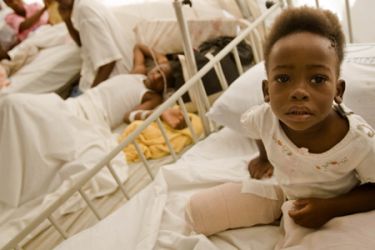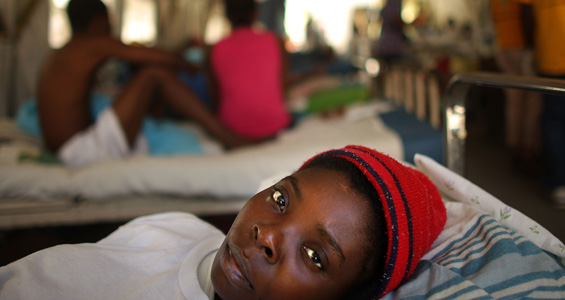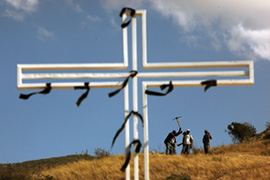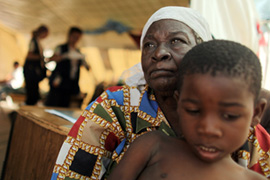‘Breaking hearts open’ in Haiti
Doctor says the world must care for Haiti with solidarity and compassion but also optimism.

 |
| Author says healthcare key to helping Haiti, but other needs must also be met [GALLO/GETTY] |
Dr Evan Lyon has just returned from Haiti where he spent two weeks working as a volunteer clinician with Partners In Health (PIH), a non-profit healthcare organisation, at the University General Hospital (HUEH) in the capital Port-au-Prince.
He reflects on the suffering he witnessed in the earthquake-devastated country and on the need to support Haiti with openness and optimism.
I think it was Nancy Dorsinville, a long-time Partners In Health (PIH) colleague and friend, who said some days ago when we crossed paths in Port-au-Prince that “Haiti needs to stop changing history”.
The nation and its people have certainly been paying dearly for their unique place in the long history of the new world and beyond. History and power continue to extract their pounds of flesh. Even considering centuries of outside disruption, I fear Haiti has never been more vulnerable.
Our work at the University General Hospital (HUEH) in Port-au-Prince and our communication with PIH colleagues nationwide in Haiti has been very sobering.
I am returning to my family today with a very heavy heart and concern that is aching from my marrow or some place just as deep.
I do not think the sadness has really begun to emerge, though I am deeply saddened.
Images are flashing up, small and large images – sad sounds, tragic sounds, bandaged and missing limbs, trauma and fear in everyone’s eyes; everyone we cared for and everyone who came to help.
Smell and dust linger on my body despite a warm shower and fair sleep in a clean airport hotel.
Basic human needs
| special report | |
|
Medicine and healthcare will play an important role in helping Haiti survive now. Especially the kind of durable, committed, accessible, and respectful care that PIH provides.
But I find my worries lingering on much more basic human needs – shelter, water, food, sanitation and compassion.
The extraordinary Haitian leadership at the hospital and the generous volunteers from around the world built a functioning general hospital again within two weeks of the earthquake. We helped many. We lost many.
Now, there are emergency and routine medical services running and improving day to day.
The hard and sad stories would take years to tell. Good stories are fewer but are all very real and inspiring.
The Haitian Red Cross has been operating again for four to five days now. Blood is available for transfusion for many of the most injured. A central warehouse – poorly supplied at the time of the quake and with all stock shaken to the ground during it – is organised and supplying surgical, medical, pediatric, obstetrics and rehabilitation services.
The hospital still needs some materials – much of it extremely vital: oxygen, sterilisation equipment for the operating rooms, tents and beds for the increasing number of patients. But it is a working hospital again – receiving patients, caring for most and facilitating transfer when we cannot meet their needs. The degree of collaboration on the university campus has been inspiring.
If I am not mistaken, there were about 100 inpatients at HUEH at the time of the earthquake. The hospital now has 500 staffed beds. Most are in tents, as most building space is either destroyed or remains unsafe. Even building space Haitian engineers or the US army corps of engineers has assessed as safe remains unused because traumatised patients and volunteer staff refuse to enter.
Shadow of death
One of the most heartening things I saw during my two weeks there happened one evening 10 days or so after the largest earthquake.
As I was walking from deep inside the campus, I saw two people walking toward me cradling small bundles. They walked quickly and with purpose but also calmly. I slowed and stood aside so they could pass. Deep in each bundle I saw a newborn baby. Both had their eyes peacefully closed and looked healthy.
I smiled, weary but happy for that small moment. One of the families smiled back looking me deep in the eyes.
I did not look at the newborns any more closely but they were both so beautiful. I knew somehow they were okay.
They were also on their way to the pediatric department, now marked with a simple cardboard sign hung from a tent in front of the destroyed pediatric building. At the gate, they must have asked who could check on their babies. Someone welcomed them and showed the way to pediatrics.
These children very likely did not need a nurse or doctor to check them out. But they certainly deserve one. Life continues even in the shadow of such sadness and death.
On the first days I was able to work in Port-au-Prince with colleagues and friends from PIH, then at HUEH, and finally with people from around the world one of the strongest impressions made on me was how silent things were in the evenings – electricity was gone, hundreds of thousands of people were sleeping in the streets. So much suffering, so close at hand, yet the silence was consuming.
Many have now left the city; many small and some larger shelters are going up for the displaced.
Traffic is returning, and becoming difficult in streets either destroyed or filled with rubble or homeless families.
Spiritual pain
 |
| Tens of thousands of people have been buried in mass graves [GALLO/GETTY] |
As an individual, I do not know a single faith or religion. But I work from deep faith just the same.
I have never worked in such spiritual pain or with the kind of vital, intimate spiritual support I felt over the past weeks in Port-au-Prince.
Engineering, medicine, public health, politics, policy and economics will all play a role in helping Haiti. But deeper and older orientations must guide us all.
The Christian tradition puts one rule before all others: “love your neighbour.” We need to listen to this, regardless of our faith or religion or lack thereof.
The Buddhist tradition offers a teaching that has been very close to me while working in Port-au-Prince alongside our brilliant and fierce colleagues. “When your heart breaks, it can either break open or it can break closed.”
I feel very sad for everyone whose heart has broken closed.
The pain is staggering, crippling. Everyone who has watched the news or has friends or family in Haiti has touched the edges of this pain.
Everyone who has seen the broken bodies and buildings, who has inhaled the dust and stench of dying in and around Port-au-Prince knows this even more intimately.
Those lucky enough to live may now have to carry some of this pain for the rest of our lives. I know my heart has never been broken like this.
I also feel my heart has broken open – enough to let me work, enough to stay upright and keep moving forward with the hope of helping my suffering sisters and brothers.
When we could not help, which was very often, I still felt open to witness, to listen, to offer my presence and kindness.
‘God left us standing’
It is possible to imagine, even now in these darkest weeks, that something good may come.
Many of our patients said out loud to me, sometimes for me to hear but more often just thinking out loud with another human being: “Bondye kite nou kanmpe” (God left us standing).
I heard this refrain from hundreds of injured and their families as I worked around the hospital.
Most people said just this, wondering, perhaps, if it would remain true. Would they still die of an injury, or would another aftershock take us all?
I had the feeling many people could not believe they were still alive. Some went so far as to say: “God left us standing for a reason.”
My heart feels the same way and I hope it will remain open, allowing, perhaps, the truth to penetrate.
I think this is the biggest job for all of us that care about Haiti right now – to remain open and committed, in solidarity, with compassion, with fierce and tremendous love.
‘We are alive’
 |
| For 10 days after the earthquake, hospitals had little pain medication [GALLO/GETTY] |
It seems reasonable at this point to say that more than 200,000 were killed and one-and-a-half to two million made homeless and displaced.
There is pressure on the infrastructure of the entire nation with so many fleeing the city to live in the countryside and in smaller cities. Much of Port-au-Prince and Jacmel needs to be rebuilt. I understand Leogane is nearly completely destroyed.
We need to stay with Haiti for a long time.
Our medicines and healthcare will play an important role, but in reality a limited one. Durable health and fulfillment of other basic human rights grows best from social conditions, the basics – shelter, water, food, sanitation, families, education, a healthy environment and reforestation, art, music.
We need to remain open and optimistic. The only other choice is nihilism, to be broken.
One evening about eight days after the earthquake, I stopped at the bedside of an elderly woman.
She had been badly injured with lots of scrapes and bruises. Her right foot had been crushed, but had been well cared for and she had not required surgery. She had a large bandage on her foot and another covering a laceration on her scalp. She was clearly in a lot of pain.
At that point, the hospital still had very limited post-operative pain medications beyond Tylenol and ibuprofen, and she had not been to surgery. Many patients who required amputation could not be given narcotics post-operatively until 10 to 12 days after the earthquake.
The woman and I spoke for a moment, me offering a little comfort and getting a lot in return; a little break from the one long day that, for me, had lasted five days or so already. For her it had been more than a week.
At least now she was sheltered in a tent and on a bed, with great nursing and medical care.
I held her face and spoke softly. She held mine as we spoke quietly. She then pulled me close and looked at me straight in the eye. We had a moment I will never forget. She said simply, strongly, almost in a whisper: “We’re alive. We’re alive. We’re alive.”
She did not cry. I did, with gratitude for her kindness and tremendous sadness for all that had happened. My heart slowed and calmed. All I could think to say was to repeat: “We are alive.”
We can continue.
Dr Evan Lyon has been an internist and volunteer clinician with Partners In Health (PIH) in Haiti since 1997. He is on the faculty of the Division of Global Health Equity at Brigham and Women’s Hospital in Boston.
For more about PIH’s work in Haiti and worldwide, visit www.pih.org.
